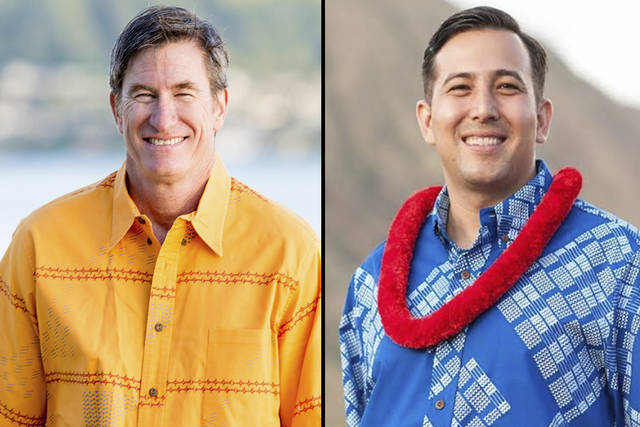East Honolulu voters will have to wait until at least the middle of next week to learn the fate of their Honolulu City Council election.
The Hawaii Supreme Court on Friday ordered parties involved in the case challenging Trevor Ozawa’s 22-vote victory over Tommy Waters in the Council District 4 election to appear for oral arguments on Tuesday at 2 p.m.
Waters’ challenge has left the nine-member Council with only eight certified members and unable to organize and pick a chairman, finalize a meeting calendar for the year or make committee assignments. The Council is scheduled to meet Monday to pick a temporary leadership structure.
The final outcome would likely affect Mayor Kirk Caldwell’s agenda during the final two years of his term. Ozawa, who is part of a Council faction more critical of the mayor, was scheduled to be elected chairman. Waters is a longtime Caldwell ally and likely would join four Council members deemed more amenable to Caldwell’s initiatives.
Waters is challenging the results on several grounds.
Earlier this week the justices seemed focused on the procedure for conducting absentee mail-in voting and pressed state and city election officials for more information specifically on the absentee ballots that were collected by the U.S. Postal Service before the 6 p.m. closing of the polls but not picked up by election personnel until afterward.
Waters had 72 more votes than Ozawa at midnight Election Day, but a final tally in the early morning hours the following day swung the result in Ozawa’s favor.
The city clerk’s office, in a filing Thursday, said there were 1,201 absentee mail-in votes from Council District 4 added to the final results, putting Ozawa over the top. Of those, 350 were collected by the USPS at 6 p.m., the same time precincts closed, and subsequently retrieved by the city for counting by the state later that night. The rest were absentee mail-in ballots that voters dropped off at Oahu polling places through Election Day.
Hawaii Revised Statutes state Opens in a new tab that mailed absentee ballots “shall be mailed and must be received by the clerk issuing the absentee ballot not later than the closing of the polls on any election day.”
Waters believes those votes should not have been counted if they weren’t in the possession of election staff by 6 p.m. State and city officials said they didn’t do anything different from previous elections in working with local Postal Service officials to ensure they did a 6 p.m. “sweep” of late-arriving ballots, which the Elections Division later retrieved.
Natalie Iwasa, who heads a voters group challenging the results, said she is pleased that the justices want to hear oral arguments. “The city was ordered to respond to very detailed questions, and I don’t think those questions were fully answered,” she said.
Iwasa, who endorsed Waters after finishing third behind Ozawa and Waters in the August runoff election, said the questions the court is asking are the same ones that have gone unanswered since she began asking them the morning after the election.
Waters, in a statement, said he was “pleasantly surprised” by the court’s decision. “Up until now, the office of elections has been very secretive about how they conduct elections in Hawaii,” he said.
Ozawa, in a statement, said he’s looking forward to participating in the arguments next week and then “moving forward with my continued service as Council member for District 4.”
“The written record submitted to the Hawaii Supreme Court establishes that all votes properly cast were counted and the people of District 4 elected their Council member,” Ozawa said.

